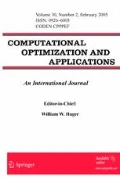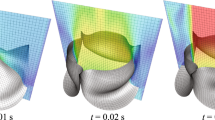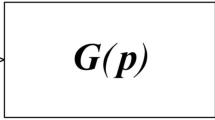Abstract
For the solution of optimal control problems governed by nonlinear parabolic PDEs, methods working on the reduced objective functional are often employed to avoid solving large systems in the dimension of the full spatio-temporal discretization. The evaluation of the reduced gradient requires one solve of the state equation forward in time, and one backward solve of the adjoint equation. The state enters into the adjoint equation, requiring the storage of a full 4D data set. If Newton-CG methods are used, two additional trajectories have to be stored. To get numerical results which are accurate enough, in many cases very fine discretizations in time and space are necessary, which leads to a significant amount of data to be stored and transmitted to mass storage. Lossy compression methods were developed to overcome the storage problem by reducing the accuracy of the stored trajectories. The inexact data induces errors in the reduced gradient and reduced Hessian. In this paper, we analyze the influence of such a lossy trajectory compression method on Newton-CG methods for optimal control of parabolic PDEs and design an adaptive strategy for choosing appropriate quantization tolerances.







Similar content being viewed by others
References
Bouras, A., Frayssé, V.: Inexact matrix-vector products in Krylov methods for solving linear systems: a relaxation strategy. SIAM J. Matrix Anal. Appl. 26(3), 660–678 (2005)
Britton, N.F.: Reaction-Diffusion Equations and Their Application to Biology. Academic Press, Waltham (1986)
Deuflhard, P., Weiser, M.: Local inexact Newton multilevel FEM for nonlinear elliptic problems. In: Bristeau, M.O., Etgen, G., Fitzgibbon, W., Lions, J.L., Periaux, J., Wheeler, M. (eds.) Computational Science for the 21st Century, pp. 129–138. Wiley, Hoboken (1997)
Du, X., Haber, E., Karampataki, M., Szyld, D.B.: Varying iteration accuracy using inexact conjugate gradients in control problems governed by PDEs. In: R. Chen (ed.) Proceedings of the 2nd Annual Conference on Computational Mathematics, Computational Geometry & Statistics (CMCGS 2013), pp. 29–38 (2013)
Fife, P.C., Tang, M.M.: Comparison principles for reaction-diffusion systems: irregular comparison functions and applications to questions of stability and speed of propagation of disturbances. J. Differ. Equ. 40(2), 168–185 (1981)
Götschel, S., Chamakuri, N., Kunisch, K., Weiser, M.: Lossy compression in optimal control of cardiac defibrillation. J. Sci. Comput. 60(1), 35–59 (2014)
Götschel, S., von Tycowicz, C., Polthier, K., Weiser, M.: Reducing memory requirements in scientific computing and optimal control. In: Carraro, T., Geiger, M., Körkel, S., Rannacher, R. (eds.) Multiple Shooting and Time Domain Decomposition Methods. Springer (2014, to appear)
Götschel, S., Weiser, M., Schiela, A.: Solving optimal control problems with the Kaskade 7 finite element toolbox. In: Dedner, A., Flemisch, B., Klöfkorn, R. (eds.) Advances in DUNE, pp. 101–112. Springer, Berlin (2012)
Greenbaum, A.: Estimating the attainable accuracy of recursively computed residual methods. SIAM J. Matrix Anal. Appl. 18(3), 535–551 (1997)
Griewank, A.: Achieving logarithmic growth of temporal and spatial complexity in reverse automatic differentiation. Optim. Methods Softw. 1(1), 35–54 (1992)
Griewank, A., Walther, A.: Algorithm 799: revolve: an implementation of checkpointing for the reverse or adjoint mode of computational differentiation. ACM Trans. Math. Softw. (TOMS) 26(1), 19–45 (2000)
Griewank, A., Walther, A.: Evaluating Derivatives: Principles and Techniques of Algorithmic Differentiation. SIAM, Philadelphia (2008)
Gutknecht, M.H., Strakoš, Z.: Accuracy of two three-term and three two-term recurrences for Krylov space solvers. SIAM J. Matrix Anal. Appl. 22(1), 213–229 (2000)
Kunisch, K., Wagner, M.: Optimal control of the bidomain system (I): the monodomain approximation with the Rogers–McCulloch model. Nonlinear Anal. Real World Appl. 13(4), 1525–1550 (2012).
Meurant, G.A.: The Lanczos and Conjugate Gadient Algorithms: From Theory to Finite Precision Computations, vol. 19. SIAM, Philadelphia (2006)
Meurant, G.A., Strakoš, Z.: The Lanczos and conjugate gradient algorithms in finite precision arithmetic. Acta Numerica 15(1), 471–542 (2006)
Nagaiah, C., Kunisch, K., Plank, G.: Numerical solution for optimal control of the reaction-diffusion equations in cardiac electrophysiology. Comput. Optim. Appl. 49, 149–178 (2011). doi:10.1007/s10589-009-9280-3.
Nielsen, B.F., Ruud, T.S., Lines, G.T., Tveito, A.: Optimal monodomain approximations of the bidomain equations. Appl. Math. Comput. 184(2), 276–290 (2007)
Nocedal, J., Wright, S.J.: Numerical Optimization, 2nd edn. Springer, New York (2006)
Rogers, J.M., McCulloch, A.D.: A collocation-Galerkin finite element model of cardiac action potential propagation. IEEE Trans. Biomed. Eng. 41, 743–757 (1994)
Simoncini, V., Szyld, D.B.: Theory of inexact Krylov subspace methods and applications to scientific computing. SIAM J. Sci. Comput. 25(2), 454–477 (2003)
Sleijpen, G.L.G., van der Vorst, H.A.: Reliable updated residuals in hybrid Bi-CG methods. Computing 56(2), 141–163 (1996)
Strakoš, Z., Tichỳ, P.: On error estimation in the conjugate gradient method and why it works in finite precision computations. Electron. Trans. Numer. Anal. 13, 56–80 (2002)
van den Eshof, J., Sleijpen, G.L.G.: Inexact Krylov subspace methods for linear systems. SIAM J. Matrix Anal. Appl. 26(1), 125–153 (2004)
von Tycowicz, C., Kälberer, F., Polthier, K.: Context-based coding of adaptive multiresolution meshes. Comput. Graph. Forum 30(8), 2231–2245 (2011)
van der Vorst, H.A., Ye, Q.: Residual replacement strategies for Krylov subspace iterative methods for the convergence of true residuals. SIAM J. Sci. Comput. 22(3), 835–852 (2000)
Weiser, M., Götschel, S.: State trajectory compression for optimal control with parabolic PDEs. SIAM J. Sci. Comput. 34(1), A161–A184 (2012)
Acknowledgments
The authors gratefully acknowledge support by the DFG Research Center Matheon, project F9.
Author information
Authors and Affiliations
Corresponding author
Additional information
A pre-print of this article appeared as ZIB-Report 13-27.
Rights and permissions
About this article
Cite this article
Götschel, S., Weiser, M. Lossy compression for PDE-constrained optimization: adaptive error control. Comput Optim Appl 62, 131–155 (2015). https://doi.org/10.1007/s10589-014-9712-6
Received:
Published:
Issue Date:
DOI: https://doi.org/10.1007/s10589-014-9712-6




